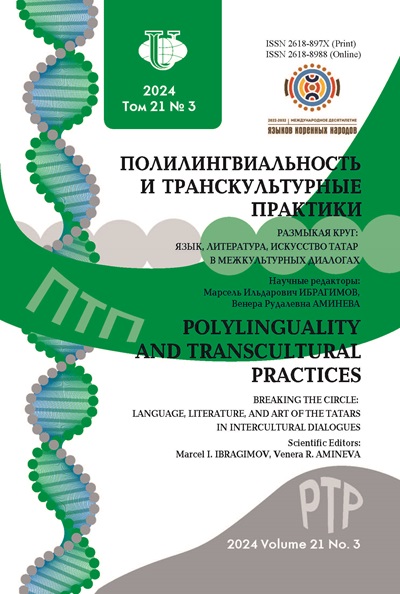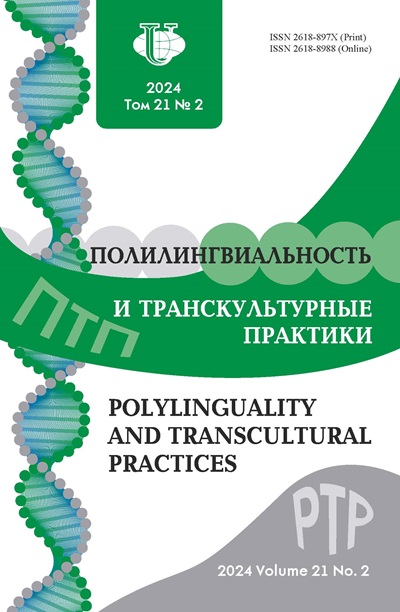Ethnic and Linguistic Self-Identification of Namzhil Nimbuyev in Poetic Discourse
- Authors: Tokareva N.A.1
-
Affiliations:
- RUDN University
- Issue: Vol 21, No 2 (2024)
- Pages: 260-279
- Section: LITERARY SPACE
- URL: https://journals.rudn.ru/polylinguality/article/view/39889
- DOI: https://doi.org/10.22363/2618-897X-2024-21-2-260-279
- EDN: https://elibrary.ru/NIQDFB
Cite item
Full Text
Abstract
The paper is devoted to the study of a topical issue in modern socio-humanitarian knowledge: verbal ethnic and linguistic self-identification of ethnically non-Russian authors in Russian-language poetic discourse. Namely, we will analyze the work of a unique Russian-speaking poet of Buryat origin Namzhil Nimbuev from the point of view of the author’s verbal demonstration of his belonging to a certain ethnicity in linguistic and ethnic aspects. This article examines the poet’s only collection “Hobbled Lightning”, published in 1972. The article has a brief theoretical introduction: the concepts of identity, self-identification, ethnic and linguistic self-identification are considered, the classification of self-identification is chosen. The main part of the article presents an analysis of N. Nimbuev’s poems on the topic of interest to us. The words of the Buryat language, national nominatives, direct descriptions of self-identification (“I am a Buryat”), indirect ones based on comparisons and others were singled out. The poet’s attitude to the Russian and Buryat languages is considered. At the end of the work conclusions are made that the author self-identifies himself with a modern Buryat, expressing the national picture of the world through the Russian language.
About the authors
Nadezhda A. Tokareva
RUDN University
Author for correspondence.
Email: tokareva_nadia@mail.ru
Teacher of Additional Education of the Department of the Russian Language and Intercultural Communication, Russian Language Institute 6 Mikhlukho-Maklaya St, Moscow, 117198, Russian Federation
References
- Stepanov, Yu.S. 1975. Methods and principles of modern linguistics. Moscow: Nauka publ. Print. (In Russ.)
- Benveniste, E. 2002. General linguistics. Translated by Yu.N. Karaulov [and others]. 2 ed. Moscow: URSS publ. Print. (In Russ.)
- Lappo, M.A. 2018. “Self-identification discourse of the Russian elite linguistic personality.” Candidate of phil. Sciences thesis. Novosibirsk. Print. (In Russ.)
- Krivykh, L.V. 2009. “The symbolic world as the basis of self-identification.” Political and philosophical yearbook, vol. 2, pp. 130–140. Print. (In Russ.)
- Bakhtikireeva, U.M. 1995. “Artistic functions of vocabulary with a national-cultural component of semantics in the novel by Chingiz Aitmatov ‘The Day Lasts More Than a Hundred Years’. Dissertation for PhD in philology. Moscow. Print. (In Russ.)
- Bulgutova, I.V. 2017. Buryat philosophical lyrics: mythopoetic foundations and traditions: monograph. Ulan-Ude: Buryat State University Publishing House. Print. (In Russ.)
- Rakhmetova, A.T., Temirgazina, Z.K. and Sh. Mazhitayeva. 2022. “Language as a factor of ethnic identity of Kazakhstani youth Altai Mediabarometer.” In Cultural and linguistic identity of East and Central Asia: a collection of articles based on the results of the International scientific online symposium “Altai Mediabarometer: cultural and linguistic identity of East and Central Asia”, December 16–17, 2021, Barnaul. Edited by N.V. Halina. Barnaul: Altai University Publishing House, pp. 38–44. Print. (In Russ.)
- Khokhlova, Yu.B. 2019. “Sculpture as a cultural marker of urban space on the example of UlanUde.” In Preservation, study and popularization of heritage: experience of participation and development vectors: materials of the All-Russian scientific and practical conference with international participation. Volume II. Ulan-Ude: East Siberian State Institute of Culture, pp. 40–46. Print. (In Russ.)
- Kremer, E.N. 2010. Problems of Russian-foreign bilingualism (linguistic identity of a bilingual personality). Dissertation for Ph.D. in philology. Moscow: RUDN University publ. Print. (In Russ.)















